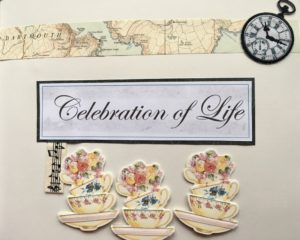When someone is born we celebrate their entrance into our world and our lives. We feast and celebrate when a child is born. We celebrate each year that passes with birthday parties, marking the annual ceremony of when someone’s life began. Why should the end of life be any different, why focus on the negative aspect of a person leaving us when we should look back and celebrate all that they have accomplished?
Celebrations of Life are becoming popular, often organised by hospices to increase the quality of life for the dying patient and to give support to the family.
They are also being organised by individuals who want to be present, and indeed to be the centre of attention, at the last celebration of their lives. It is a time to honour and appreciate the living.
They want to enjoy their own funeral and the opportunity it gives them to see for the last time their friends, relatives, former colleagues, neighbours, team mates and those whose lives have touched theirs.
You can acknowledge important relationships, recount stories, give and receive comfort, and answer questions. You can smell the flowers, hear the eulogy, readings, prayers, and music. You can speak of your own life and legacy, about what mattered to you and motivated or inspired you over your lifetime, and about what your relationships have meant to you. You can convey hopes, dreams, and last wishes and share in the tears and in the laughter.
Having a Celebration of Life doesn’t mean there can’t be a traditional funeral after death. It simply means that there is a ceremony with the person before they are gone, and they get to enjoy life with those they love before they must go, and hopefully pass with renewed good memories and the feeling that they’ve made peace with their life, peace with those in their life, and peace with their eventual death.



